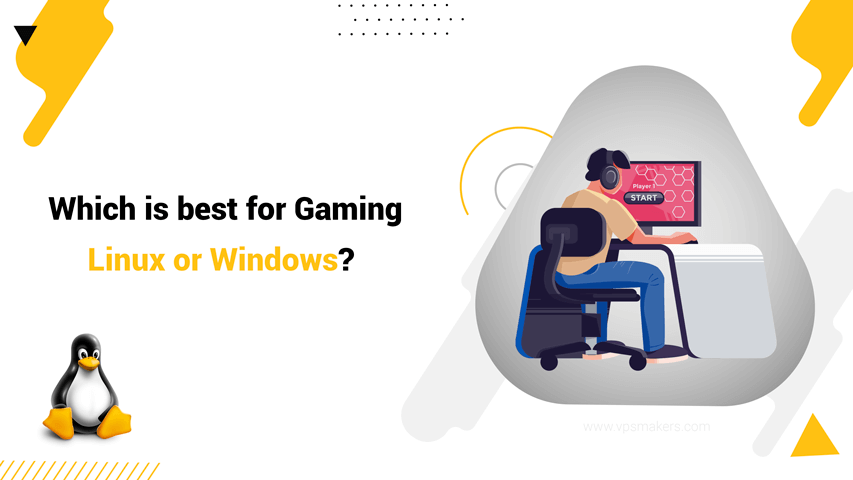Which is best for gaming Linux or Windows?
Windows has historically remained the dominant choice for PC gamers, but the Linux operating system, with its open architecture and emphasis on user control, is a viable option for PC gaming.
In the PC gaming community, there is an ongoing debate about whether Windows or Linux serves as the optimal gaming platform. My goal in this article is to provide an objective assessment of the merits and limitations of Linux for gaming compared to Windows.
While Linux games have progressed tremendously, Windows still excels in some areas, such as anti-cheat support and game compatibility, and Windows VPS is used to increase game performance and speed.
Is Windows the best platform for games, or could Linux be a worthy alternative?
I’ve been gaming on Windows and Linux for the past decade, and I’ve seen the Linux gaming experience steadily improve since Steam first launched on the platform in 2013. First, game support on Linux should be improved.
But in recent years, there have been big improvements thanks to technologies like Steam Play/Proton that allow Windows games to run on compatibility layers.
Now, when someone asks me
Is Linux Better than Windows for Gaming?
I don’t give a simple yes or no. The truth is Linux gaming has come a long way, but there are still some tradeoffs to consider. In this post, I’ll take a deeper look at how Linux compares to Windows for games nowadays in terms of performance, customization options, and, of course, software support. My aim is to help readers objectively assess whether Linux could work for their gaming needs.

What is the history of Linux gaming?
In the early 2000s, Linux was not a practical choice compared to Windows. During this period, game developers focused almost exclusively on Windows. Several key factors drove this focus on Windows:
DirectX Integration: Microsoft’s DirectX API was deeply integrated into Windows, providing graphics, audio, and input frameworks tailored for game development.
Market Share: Windows accounted for over 90% market share of consumer desktop operating systems.
Driver Support: Graphics drivers on Linux were less mature and often needed more optimizations, leading to inferior performance in games. Hardware vendors primarily focused their efforts on Windows drivers.
Porting Difficulties: The wide variety of Linux distributions added complexity for developers porting games from DirectX-based Windows code. The lack of middleware and internal Linux development expertise presented additional roadblocks.
In 2000, Loki Software ported Windows games to Linux, but in 2002, the project failed. Then Linux gamers started running Windows games on Linux through WINE and Cedega, which required high technical expertise.
Steam’s arrival on Linux in 2013 was accompanied by Valve’s Proton compatibility layer, which made thousands of Windows games playable on Linux.
After the changes made in 2013, the commercial support of Linux, the formation of dedicated forums, as well as the focus of game developers on Linux increased to such an extent that today Linux games are slowly compared to Windows games. Limitations discouraged Persons from adopting Linux as the main operating system of the game.
Does Steam work on Proton?
When Valve initially launched its Steam client for Linux in 2013, it significantly heightened awareness about gaming on the platform. However, a significant hurdle remained: the incompatibility with the vast library of existing Windows games. This is where Steam Play and, subsequently, Proton came into play.
In 2018, Steam Play emerged as a solution to enable Windows games to run seamlessly on Linux via the Steam client. It harnessed a groundbreaking compatibility layer known as Proton, meticulously crafted by the experts at Code Weavers. Proton, which builds upon the foundations of WINE, was explicitly fine-tuned for optimizing the performance of Steam games.
Through Proton, I discovered:
- The unexpected ease with which I was able to play a large number of my previous Windows game collections without the need for any modifications or setups.
- Remarkable performance that often matched or even exceeded that of native Windows gaming, based on my personal experience.
- Straight out of the box, prominent games like Dota 2 and Counter-Strike, as well as Risk of Rain 2, will run without a hitch.
Proton elevated Linux gaming by seamlessly facilitating compatibility with a vast array of games. As this technology matured, the list of fully compatible games expanded into the thousands. This development made revisiting my backlog of games on Linux a far more appealing prospect compared to the struggles I faced with Wine in earlier years. Proton was truly a game-changer for Linux gaming, and it’s worth considering when you Buy Linux VPS.
Does Linux support gaming?
As Proton has opened the door to enjoying existing Windows games, there’s an additional uplifting trend—a surge in the number of titles that now launch natively on Linux.
Increasingly, game developers are acknowledging Linux as a viable gaming platform and extending their support from the very outset of a game’s release. This approach ensures the optimal gaming experience, far superior to relying on compatibility layers.
Game engines like Unity and Unreal Engine now support Linux, which has greatly reduced the technical difficulties involved in porting games. Developers can effortlessly export their projects to Linux platforms.
Indie studios, in particular, have warmly embraced Linux, with many smaller titles simultaneously releasing across Windows, Mac, and Linux. Games like Celeste, Hollow Knight, and Dead Cells provided me with exceptional native experiences.
Even some major AAA games, like Dying Light 2, have launched with Linux builds available, indicating that larger companies are increasingly accommodating our platform.
As native support continues to expand across various genres and development studio sizes, it’s now more feasible than ever for Linux gamers to enjoy a continually growing library of Linux-compatible games well into the future. So, when you Linux VPS, you’re ensuring access to a thriving gaming ecosystem.
Will games run faster on Linux?
Due to its lower overhead architecture, some benchmarks indicate Linux can match or exceed Windows gaming performance, especially on lower-powered hardware. Potential Linux performance advantages include:
- Lower CPU/RAM usage with less background bloat.
- Lighter graphics drivers and closer-to-metal control of GPUs.
- Fewer background processes compete for resources.
However, compatibility layers like Proton still have minor overheads versus native Windows. So, for games using invasive anti-cheat or requiring flawless execution, Windows remains superior currently. But in terms of raw processing throughput, Linux has proven itself as a very capable gaming OS.
Limitations of Linux Gaming
Despite the massive advances over the past decade, Linux still has some limitations as a gaming platform:
- Many competitive online games use invasive anti-cheat software that does not work on Linux. This includes popular titles like Apex Legends, Destiny 2, and others.
- A small percentage of games still do not work properly on Proton and lack native Linux versions. Users may miss out on some titles.
- Linux generally receives ports later than Windows, sometimes months later. Gamers who want to play on launch day may be impacted.
- The lack of official Nvidia Optimus support can complicate laptop gaming setups compared to Windows.
- While the situation is improving, these factors still give Windows an overall edge for some gamers. However, limitations that stem from anti-cheat software and release schedules apply less to single-player experiences.
summary
While Windows remains superior for some specific high-end gaming scenarios, Linux has evolved into an extremely viable alternative platform, especially for casual and single-player-focused gamers. Technologies like Proton provide access to much of the Steam gaming library while native ports continue proliferating.
For users focused on customization and performance optimization, Linux offers unparalleled strengths. And with ongoing improvements, its remaining limitations may further recede. For many PC gaming users today, Linux can absolutely serve as a primary gaming OS. While it may not definitively surpass Windows yet, Linux undoubtedly deserves consideration based on the immense progress made in recent years.

